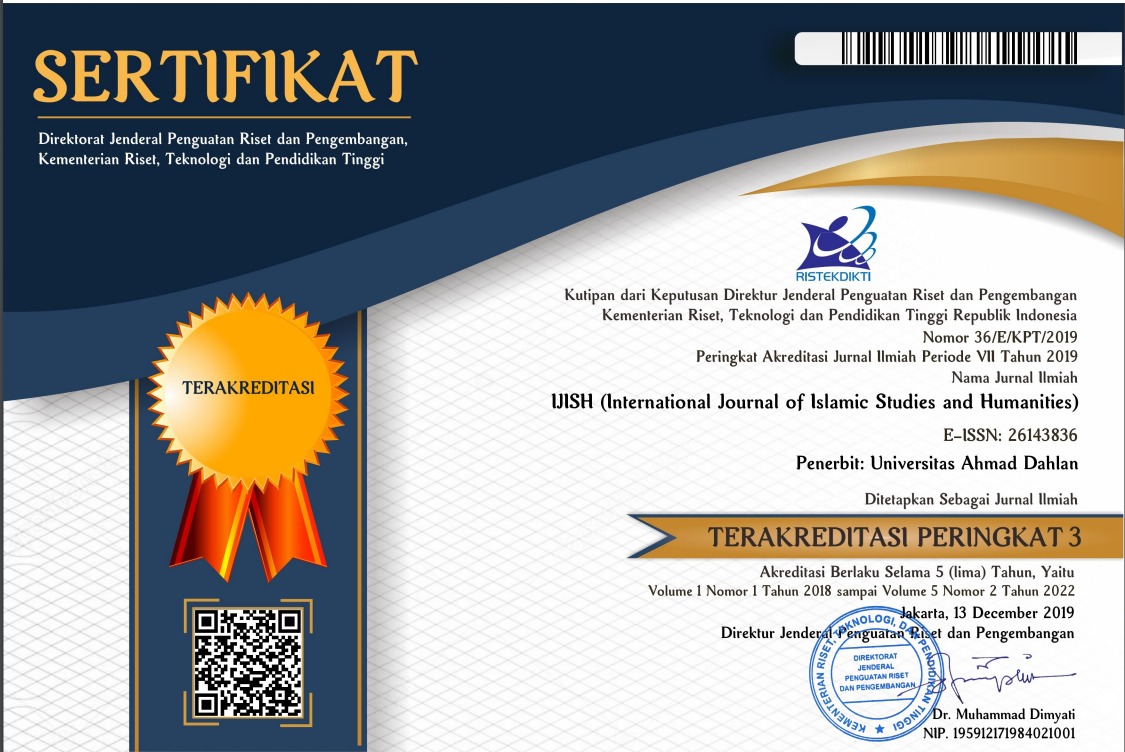From apocalypticism to eschatology: a comparative analysis of western “Utilitarianism” and Islamic “Maṣlaḥah”
DOI:
https://doi.org/10.26555/ijish.v7i1.9705Keywords:
Western Utilitarianism, Islamic Maṣlaḥah, ethics, community welfare, Societal ImplicationsAbstract
By employing Utility tools or moral conducts based on “the greatest good for the greatest number”, the Utilitarian mechanism maximizes the Utility for majority. This ethical theory is evidently grounded in human reason free from any transcendent revelation which is all the way expounded as a purely secular product of renaissance. While, in contrast to “Utilitarianism”, the Islamic “Maṣlaḥah” transcends the spatial structure and materiality to connect the life hereafter, hence the immediate good and bad of this world are but the function for the final good or bad pertaining to the Afterlife. Reviewing and analyzing relevant contents, this paper explores the key differences and similarities between Western “Utilitarianism” and Islamic “Maṣlaḥah”. Firstly, the paper identifies that both “Utilitarianism” and “Maṣlaḥah” aim to promote human welfare and happiness, but differ in their approach to defining and measuring the concept. Secondly, the paper examines the role of reason and revelation in shaping ethical decision-making in both traditions. Finally, it discusses the practical implications of “Utilitarianism” and “Maṣlaḥah” in contemporary societies. While “Utilitarianism” is often associated with individualistic and secular societies, Islamic “Maṣlaḥah” is deeply embedded in Islamic culture and tradition, which emphasizes community values and religious obligations.
References
Abdulhameed, N. M. (2021). Ethical Dimension of Maqasid al-Shari’ah and its Implication to Human Capital Development. IJISH (International Journal of Islamic Studies and Humanities), 4(1), 20. https://doi.org/10.26555/ijish.v4i1.2621
Al-aaidroos, M., Jailani, N., & Mukhtar, M. (2016). The Utilitarian Decision Making from Islamic Perspectives: Review and Settlement Attempt. International Journal on Advanced Science, Engineering and Information Technology, 6(6), 896. https://doi.org/10.18517/ijaseit.6.6.1378
Al-Būṭī, M. S. R. (1973). Ḍawābiṭ al-Maṣlaḥah fī al-Sharī ‘ah al-Islāmiyyah. In Beirut: Mu’assasah al-Risālah.
Al-Ghazali, A. (1961). Faisal At-Tafriqa Bain Al-Islam Wa-Z-Zandaqa. Dar Ihya’ Al-Kutub Al- 'Arabiya.
Al-Ghazali, A. H. (n.d.). Al-Mustafā Min ’Ilm Al-Uṣūl (Vol. 1). Dār Al-Fikr.
Al-Raysūni, A. (1995). Naẓariyat Al-Maqāṣid ’Inda Al-Imām Al-Shāṭibī. Al-Ma’had Li Al-'Ali Al-Fikr Al-Islāmī.
Armitage, D. (2007). The Declaration of Independence. Harvard University Press. https://doi.org/10.4159/9780674020276
Bentham, J. (1781). An introduction to the principles of morals and legislation. In History of Economic Thought Books. McMaster University Archive for the History of Economic Thought.
Bentham, J. (2008). A Comment on the Commentaries and A Fragment on Government. Oxford University Press.
Emon, A. M. (2010). Islamic Natural Law Theories. Oxford University Press. https://doi.org/10.1093/acprof:oso/9780199579006.001.0001
Griffel, F. (2009). Al-Ghazali’s Philosophical Theology. Oxford University Press. https://doi.org/10.1093/acprof:oso/9780195331622.001.0001
Heriyanti, K. (2020). Moderasi Beragama melalui Penerapan Teologi Kerukunan. Maha Widya Duta: Jurnal Penerangan Agama, Pariwisata Budaya Dan Ilmu Komunikasi, 4(1), 61–69. https://doi.org/https://doi.org/10.55115/duta.v4i1.783
Karacuka, M., & Zaman, A. (2012). The empirical evidence against neoclassical utility theory: a review of the literature. International Journal of Pluralism and Economics Education, 3(4), 366. https://doi.org/10.1504/IJPEE.2012.052695
Mill, J. S. (1863). Utilitarianism. London: Parker, Son, and Bourn, West Strand. Bölüm.
Quinn, M. (2016). Jeremy Bentham, “The Psychology of Economic Man”, and Behavioural Economics. OEconomia, 6-1, 3–32. https://doi.org/10.4000/oeconomia.2249
Shidiq, S. (2011). Usul Fiqh. Kencana.
Taylor, C. (1982). The diversity of goods. In Utilitarianism and Beyond (pp. 129–144). Cambridge University Press. https://doi.org/10.1017/CBO9780511611964.008
Downloads
Published
How to Cite
Issue
Section
License
Copyright (c) 2024 Mohammad Abul Mufazzal, Naseem Fatima Chaudhary

This work is licensed under a Creative Commons Attribution-ShareAlike 4.0 International License.
Authors who publish with IJISH (International Journal of Islamic Studies and Humanities) agree to the following terms:
- Authors retain copyright and grant the journal right of first publication with the work simultaneously licensed under a Creative Commons Attribution License (CC BY-SA 4.0) that allows others to share the work with an acknowledgment of the work's authorship and initial publication in this journal.Â
- Authors are able to enter into separate, additional contractual arrangements for the non-exclusive distribution of the journal's published version of the work (e.g., post it to an institutional repository or publish it in a book), with an acknowledgment of its initial publication in this journal.
- Authors are permitted and encouraged to post their work online (e.g., in institutional repositories or on their website) prior to and during the submission process, as it can lead to productive exchanges, as well as earlier and greater citation of published work.

This work is licensed under a Creative Commons Attribution-ShareAlike 4.0 International License.






